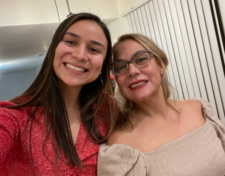
Ever since I can remember, I have been providing English interpretation and translation for my parents, who are monolingual Spanish speakers. Without other options, my parents were forced to rely on me to help them communicate, not just at grocery stores or school functions, but also as they tried to navigate more serious things like doctors appointments. As young as age 10, I can remember specifically providing interpretation for my parents and younger siblings at our family clinic for our routine check-ups.
Growing up, and being the daughter of immigrants from Mexico, I always thought this was normal. I thought of it like a debt I needed to pay for the advantages of being a first generation U.S. American. But I also remember feeling very alone in my experience. I thought that only my parents struggled to communicate, and that made me think of my family as the problem. I saw my parents’ lack of English as the barrier to participation in ordinary life outside of our Mexican community, and I saw myself as the solution.
It wasn’t until last summer when I moved into my role as Community Organizer at Center for Health Progress that I realized I wasn’t alone in my experience. Over just a few months, I had more than 100 one-on-one conversations with community members in Fort Morgan and I heard countless stories that reflected my own experiences providing interpretation as a young child. These stories came not just from children of immigrants who provided interpretation, but also from adults who relied on their kids to interpret.
"Checking the box" on meaningful access
Our Fort Morgan organizing team has identified interpretation services in the healthcare system as a priority issue, and have researched how this is impacting people in Morgan County. They learned there are more than 27 languages and dialects in our community, and they realized language access in health care in Morgan County is essentially non-existent.
Under both Title VI of the Civil Rights Act and Executive Order 13166, any facilities that offer medical services and receive federal funds must provide "meaningful access." This means that providers must offer qualified interpreters and translation of medical documents and prescriptions.
Yet, health care clinics and hospitals seem to be merely “checking the box” to comply by providing interpretation via phone or an app on a tablet. Those who are directly impacted by this have not had a say in whether existing services truly provide “meaningful access.” Relying on interpretation by phone often means extensive wait times. For people who speak a small amount of English but not enough to comfortably communicate (particularly regarding complex medical issues), they are often pressured to proceed in English just to move things along. This is a common experience shared by our leaders and their families.
When my family member was recently recovering after surgery, I called to coordinate delivery of an oxygen tank and used the opportunity to see firsthand what people are experiencing when they rely on interpretation by phone. I waited on hold for more than an hour and when they finally called me back, the person was a monolingual English speaker. They asked if I could manage in English because the wait would be even longer, and I was so exhausted and frustrated that I agreed to continue in English. I had valuable time on the phone, and I thought of how few people could put their paid work, childcare, or other responsibilities on hold for such a long time, while English speakers sailed through without this added hurdle.
We're at risk, because they're cutting costs
One of our leaders, Gloria, shared her recent experience, when she reluctantly agreed to interpret. “La cosa es que no siempre hay intérprete, una de esas veces me tocó ir al cuarto de emergencias con mi hermano y cuando pedí intérprete me preguntaron si yo lo podía hacer mejor. Eso me hace sentir nerviosa y más estresada.” (“The thing is that there is not always an interpreter; one of those times I had to go to the emergency room with my brother and when I asked for an interpreter they asked me if I could do it myself. That made me feel nervous and more stressed.”)
When family members, friends, or staff who are not trained as health care interpreters try to interpret in health care settings, errors in understanding are more likely to occur.
A medical interpreter’s responsibilities are to interpret information for the medical staff and the patient so providers can properly address the patient’s symptoms, concerns, or questions. Professional medical interpreters are knowledgeable about medical terminology and are trained to understand the emotional aspects that influence communication regarding medical issues.
Relying on an interpreter that does not understand medical terminology can have serious consequences, and when timing is critical, an untrained interpreter can lead to delayed treatment and further medical complications.
For children who interpret for their family members – a level of responsibility that could be considered outside the scope of what’s considered age-appropriate – these experiences often lead to lack of self confidence, which can follow them into adulthood. Khadro, one of our organizing team leaders who immigrated from Somalia at a young age, shared, “I always hope that I’m saying the right thing, especially recently when my father needed surgery. It was very important for me to say the right thing because it was life or death.”
In addition to the burdens placed on family members to provide interpretation, and the risks that come with relying on people who are not trained in medical interpretation, many people reported that lack of interpretation leads to lack of trust with providers, and the healthcare system as a whole. As non-English speakers, they are treated as an inconvenience, and they miss out on the type of support and human interaction that helps buffer the fear and uncertainty that comes with many medical diagnoses and treatments. These negative experiences add up, and oftentimes, folks are waiting as long as they can to go to the doctor. Delayed care and lack of care continue to have dire consequences for immigrant communities.
What we deserve, and what we demand
I want to make it very clear: parents and other adult family members who are essentially forced to rely on children or relatives to interpret, and those who struggle to interpret adequately, should feel no guilt or self blame. When I spoke with Khadro, she emphasized, “It’s not my parent’s fault, it’s the system's fault.”
Our health care system continues to prioritize profits over people, and health care executives are padding their own pockets at the expense of our non-English speaking communities. We need to be the ones determining what “meaningful access” looks like. We demand in-person interpretation from medically trained interpreters. Every one of us deserves to be able to get quality care, while communicating in the language of our hearts.




